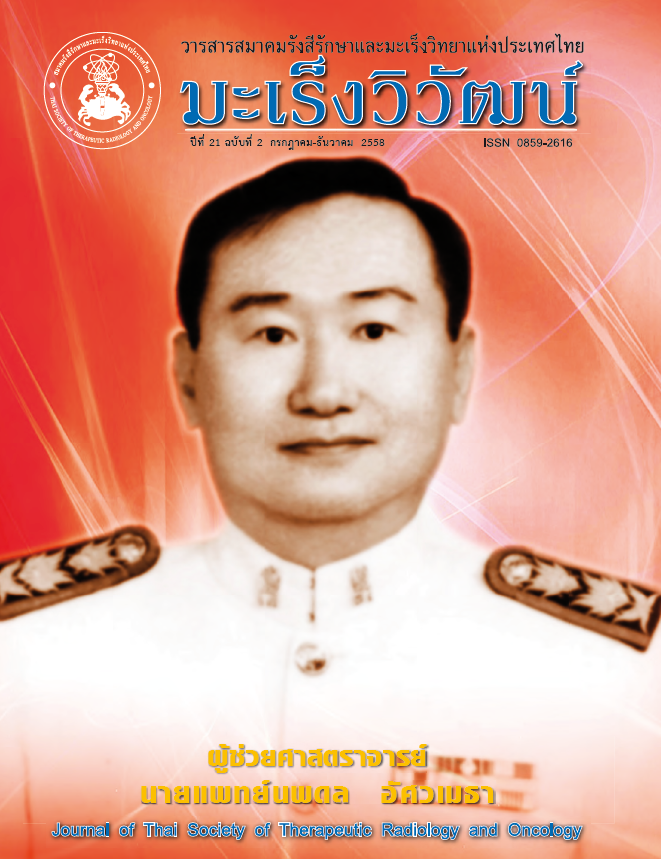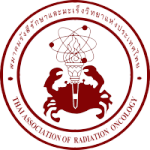EFFECTS OF SUPPORTIVE-EDUCATIVE NURSING SYSTEM ON DERMATITIS OF PATIENTS WITH HEAD AND NECK CANCER RECEIVING RADIATION
Keywords:
Head and Neck Cancer, Radiation, Dermatitis, Supportive - educative Nursing System.Abstract
Backgrounds: In head and Neck Cancer Patients who receive high dose radiation treatment, the most common symptom is skin dermatitis that depends on the size and stage of cancer. Supportive - educative nursing system can be applied to head and neck cancer patients to reduce the skin effect. Objective: 1. To study the severity of dermatitis in head and neck cancer patients, receiving radiation therapy, who has been given the knowledge by supportive - educative nursing system on dermatitis 2. To compare the severity of dermatitis between the experimental group who received the knowledge by supportive - educative nursing system with the control group who received the knowledge by standard nursing care in dermatitis Materials and methods: This quasi-experimental study aimed to study the effects of supportive - educative nursing system on dermatitis in patients with head and neck cancer receiving radiation. The participants consisted of 32 cancer patients receiving radiation at the Wattanosoth hospital, Bangkok dusit medical services public company limited. The first 16 subjects were assigned to the control group, who received the standard care. The second 16 subjects assigned to the experimental group. The program consisted of the following nursing intervention: building relationship, teaching, guiding, supporting, and providing supportive environment within seven- week period. Data were collected using the skin self - reaction assessment the interview on feeling of patients toward skin care in radiation area and the skin-care record. The series of data collection were collected at week 1 prior to the experiment (T0), week 2 (T1), week 3 (T2), week 4 (T3), week 5 (T4), week 6 (T5), and week 7 (T6). The effectiveness of the program was determined by severity of dermatitis. Hypotheses were tested using analyses of percentage, mean, minimum, maximum and ANOVA repeated measurements. Results: The results showed that both groups had statistically significant increase in severity of dermatitis along the radiation period as compared with before radiation treatment (p<0.05). The experiment group, who receiving supportive - educative nursing care, had significantly less severe dermatitis compared with the control group (p<0.05) Conclusion: Using Supportive - educative Nursing System in the treatment of head and neck cancer patients receiving radiotherapy can reduce the severity symptoms of dermatitis.
References
สถิติสาธารณสุข [อินเทอร์เน็ต]. สาเหตุการตาย 10 อันดับแรก ปี พ.ศ. 2551-2554. [เข้าถึงเมื่อ 20 พฤศจิกายน 2556]. เข้าถึงได้จาก http://203.157.19.191/2.3.4-49.xls
พรชัย โอเจริญรัตน์. ศัลยศาสตร์ ศีรษะ คอ และเต้านม (Vol.4). กรุงเทพมหานคร : บริษัทสยามการพิมพ์ จำกัด; 2547.
Cohen J. Statistical power analysis for the behavioral sciences. New York : Lawrence Erlbaum Associates; 1998.
อภันตรี กองทอง. ผลของระบบการพยาบาลแบบสนับสนุนและให้ความรู้ต่อความเหนื่อยล้าในผู้ป่วยมะเร็งหลังโพรงจมูกที่ได้รับรังสีรักษา. [วิทยานิพนธ์ปริญญาพยาบาลศาสตรมหาบัณฑิต]. เชียงใหม่: มหาวิทยาลัยเชียงใหม่; 2544.
พวงทอง ไกรพิบูลย์. รังสีรักษา. กรุงเทพฯ: ไทยวัฒนาพานิช; 2552.
พวงทอง ไกรพิบูลย์. อยู่กับมะเร็งอย่างเป็นสุข. กรุงเทพมหานคร : ซีเอ็ดยูเคชั่น; 2551.
ปรมาภรณ์ ปราสาททองโอสถ, สืบวงศ์ จุฑาสิทธิ์, อดุลย์ รัตนวิจิตรศิลป์. ศัลยศาสตร์ ศีรษะ คอ และเต้านม. นนทบุรี: พี ซี เค ดีไซน์; 2552.
อรพรรณ สุพรรณภพ. กระบวนการพัฒนาแผนการดูแลผู้ป่วย: Clinical Pathway for Post Radiation Head and Neck Cancer in Patient Receiving HBOT. ม.ป.ท.; 2552.
Orem, D. E. Nursing concept of practice. 6th ed. St. Louis: Mosby; 2001.
สมจิต หนุเจริญกุล. การพยาบาล : ศาสตร์ของการปฏิบัติ. กรุงเทพฯ: วี.เจ.พริ้นติ้ง; 2543.
วันทนีย์ ดวงแก้ว. ผลของระบบการพยาบาลแบบสนับสนุนและให้ความรู้ต่ออาการปากแห้งและเยื่อบุช่องปากอักเสบในผู้ป่วยมะเร็งศีรษะและคอที่ได้รับรังสีรักษา. [วิทยานิพนธ์ปริญญาพยาบาลศาสตรมหาบัณฑิต]. สงขลา : มหาวิทยาลัยสงขลานครินทร์; 2554.
Benomar S, Boutayeb S, Lalya I, Errihani H, et al. Treatment and prevention of acute radiation dermatitis: Cancer Radiotherapy; 2010.
สุจิตรา ชัยกิตติศิลป์. การศึกษาเปรียบเทียบผลการดูแลผิวหนังด้วยวิธีที่แตกต่างกันในผู้ป่วยมะเร็งศีรษะและคอที่ได้รับรังสีรักษา. [วิทยานิพนธ์ปริญญาพยาบาลศาสตรมหาบัณฑิต]. กรุงเทพฯ: มหาวิทยาลัยมหิดล; 2532.
บุญจันทร์ วงศ์สุนพรัตน์. ผลของระบบการพยาบาลแบบสนับสนุนและให้ความรู้ต่อความรู้สึกไม่แน่นอนในความเจ็บป่วยในผู้ป่วยมะเร็งศีรษะและคอที่กำลังรับรังสีรักษา. [วิทยานิพนธ์ปริญญาพยาบาลศาสตรมหาบัณฑิต]. กรุงเทพฯ: มหาวิทยาลัยมหิดล; 2533.
อภิรดี ชูพันธ์. ผลของการประยุกต์การพยาบาลระบบสนับสนุนและให้ความรู้ต่อการดูแลตนเองของผู้ป่วยมะเร็งปากมดลูกที่ได้รับรังสีรักษา. [วิทยานิพนธ์ปริญญาพยาบาลศาสตรมหาบัณฑิต]. กรุงเทพฯ: มหาวิทยาลัยมหิดล; 2544.
Downloads
Published
How to Cite
Issue
Section
License
บทความที่ได้รับการตีพิมพ์เป็นลิขสิทธิ์ของวารสารมะเร็งวิวัฒน์ ข้อความที่ปรากฏในบทความแต่ละเรื่องในวารสารวิชาการเล่มนี้เป็นความคิดเห็นส่วนตัวของผู้เขียนแต่ละท่านไม่เกี่ยวข้องกับ และบุคคลากรท่านอื่น ๆ ใน สมาคมฯ แต่อย่างใด ความรับผิดชอบองค์ประกอบทั้งหมดของบทความแต่ละเรื่องเป็นของผู้เขียนแต่ละท่าน หากมีความผิดพลาดใดๆ ผู้เขียนแต่ละท่านจะรับผิดชอบบทความของตนเองแต่ผู้เดียว




